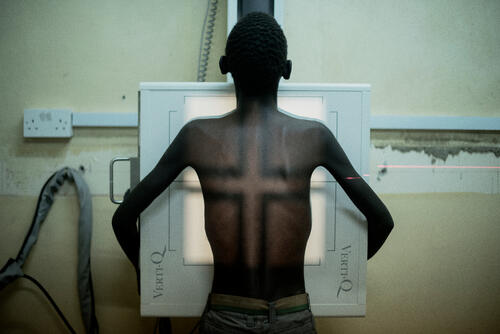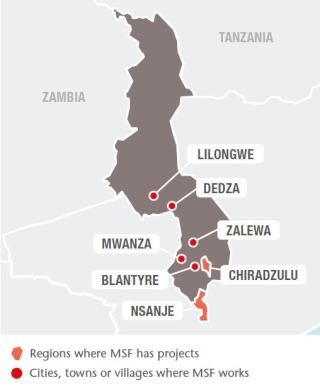
27,300
27,3
2,800
2,8
1,000
1,
Since the 1990s, when the HIV epidemic was at its peak in the country, Malawi has shown a lot of improvement but there remains work to be done. According to UNAIDS, HIV prevalence dropped from an estimated 14.2 per cent in 2003 to 9.2 per cent in 2016.
By mid-2017, 714,691 people living with HIV were taking lifelong antiretroviral treatment.
Yet HIV remains the leading cause of death among adults in Malawi, and there are still around 28,000 new cases each year. The progress made relies heavily on international funding, and there is a critical lack of qualified health staff.
Focusing HIV care on adolescents and AIDS patients in Chiradzulu
In Chiradzulu, MSF is completing the four-year handover of its HIV activities to the Ministry of Health. In 2016, MSF studies showed gaps in the detection and timely management of patients failing first- and second-line HIV treatment and revealed that only 30 per cent of adolescents were under effective treatment.
MSF is developing specific activities aimed at improving management of these patients and their adherence to treatment. They include setting up comprehensive, multidisciplinary services for adolescents, patients facing difficulties in staying on treatment or those not responding to treatment.
Prevention and early treatment of cervical cancer
Malawi has the highest rate of cervical cancer in the world, with an estimated 75 of every 100,000 women newly affected each year. Yet only 10 to 20 per cent of women in the country receive early screenings and preventive vaccination is not implemented. MSF is developing a comprehensive project in Blantyre city and Chiradzulu district, including screening and treatment for pre-cancerous lesions, vaccination against human papillomavirus, treatment for cervical cancer and palliative care.
Improving care for HIV and tuberculosis (TB) in Nsanje
Through the ‘Nsanje HIV TB District Support’ model, MSF is assisting the underfunded district health service to strengthen its coordination, fill critical gaps (for example, with staff and drug supplies) and improve HIV and TB services. MSF teams mentor health staff in Nsanje hospital and 14 health centres. To reduce HIV-related mortality, special emphasis is placed on patients with advanced HIV, from early detection to improving care in the referral hospital.
Comprehensive care for sex workers
As part of its transnational ‘corridor’ project along transport routes between Malawi and Mozambique, MSF provides comprehensive HIV, TB and sexual and reproductive health services, for truck drivers and sex workers in one-stop clinics in Mwanza, Zalewa, Dedza and Nsanje.
Prison project
In Chichiri and Maula prisons, MSF is providing a package of screening and primary healthcare for HIV and TB, as well as improving water and sanitation services for inmates. The model has been accepted as a best-practice example. MSF is calling for it to be implemented nationwide, and for the extreme overcrowding and malnutrition in prisons to be addressed.



















